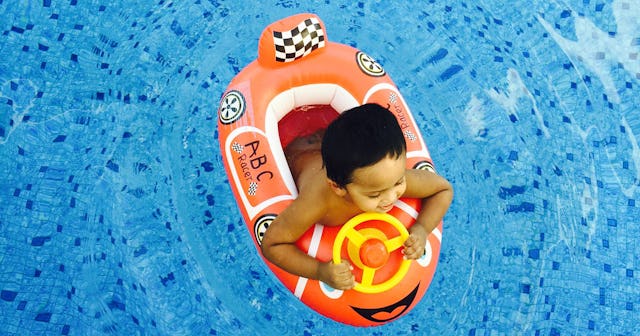I Witnessed A Drowning And We Need To Stop Thinking It Couldn't Happen To Us

I watched powerlessly from the beach as a deadly current swept two 13-year-old girls out into treacherous waters. One was rescued, the other submerged, and a painful battle between hope and time commenced.
At her vigil, people turned their heads and stifled their cries. I suppose adults were trying to keep a brave face for the victim’s young friends, and the children were following the lead of the adults. There was one woman, though, who sobbed unabashed. “I saw her go in,” she cried, squeezing my hand. “I didn’t know she would die.”
“I didn’t know” is the phrase echoed by friends, families, and witnesses of drowning victims around the world, “please learn from me,” their plea, and “not one more” their rallying cry.
“I didn’t know… a child under 30 pounds could drown in under 30 seconds.”
Parents Preventing Childhood Drowning
“I didn’t know… nearly 70% of childhood drownings happen when the child was not expected to be near the water.”
“I didn’t know… that most families of drowning victims have evidence (time stamped pictures, phone calls, surveillance video etc.) of their children alive within 5 minutes of finding them in the water.”
But mostly, what is underneath every “I didn’t know” is the deadly mindset of “I didn’t know it could happen to me, in front of me, or in spite of my love.”
Regardless of what trolling commenters might have you believe, parents of drowning victims love their children fiercely. They are no more neglectful than the parents who posts that adorable photo of their child playing in the makeup, drawing on the walls, or dropping things in the toilet during a momentary lapse of supervision. And their children, the faultless victims to a leading killer, were loved so completely that they walked through the world and into water feeling safe. Their parents raised them to feel protected because, for the most part, they were. But what you don’t know can hurt you.
Parents Preventing Childhood Drowning
So, here’s what you need to know:
Drowning can take your child. Water is all around us, and we usually don’t drown, so we inadvertently let our guard down. We have to fight that automated complacency with layers of protection: constant supervision, a designated water watcher, fences enclosing bodies of water with self-latching and self-closing gates, alarms on pools and doors, CPR classes, removal of dog doors, life-jackets on open water, and providing the child with the skills they need to self-rescue.
Parents Preventing Childhood Drowning
Every time you participate in blaming the victim, blaming the caregiver, or blaming Darwinism, you are contributing to the stigma of drowning. That stigma underwrites the “it can’t happen to me” mindset and is the greatest threat to prevention efforts. If we are sickened that the number one reason your healthy child will not make it to kindergarten is because he or she died in a preventable drowning accident, then we have an obligation to confront this stigma, both in ourselves and others. Without eradicating the stigma, we cannot change our culture around water and our children will continue to needlessly die.
Water safety is for everyone. Water never stops being a threat. Drowning is the leading cause of unintentional injury death for children aged 1-4 and second only to car accidents in children aged 14 years and younger with rates tripling at age 15 in open water. If you consider how often teens are in cars versus the water, these statistics are even more sobering. And for what it’s worth, adults drown too–even strong swimmers, sometimes in front of their children, sometimes trying to save their children. Prevention is key.
Parents Preventing Childhood Drowning
I once asked the mother of a drowning victim what would have made a difference for her 11-year-old son. My heart broke as she said, “If we weren’t so stupid.” I feel the need to be very clear here: “I didn’t know” is not equal to “stupid.” Families of drowning victims have paid the ultimate price for the knowledge they carry. If they say, “wear life vests on open water,” then do it. If they say, “don’t have a dog door during the toddler years,” then don’t. At the very least, we need to listen to them; after all, they are fighting for our kids now. So, if you’ve heard their message and changed your behavior, remember to thank them–your child’s life is now honoring their child’s memory.
Toddlers are mischievous, curious, and fun. So, here’s a formidable reminder that parents who have lost their children to drowning aren’t neglectful; rather, the rest of us are either lucky or already learned from their loss and put up the layers.
Combat the stigma, join the #lookforthelayers challenge to spread awareness of the risk of drowning.